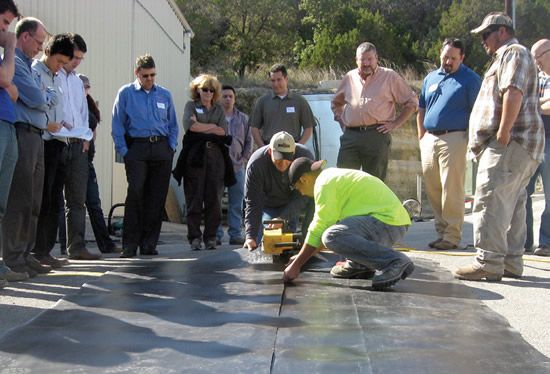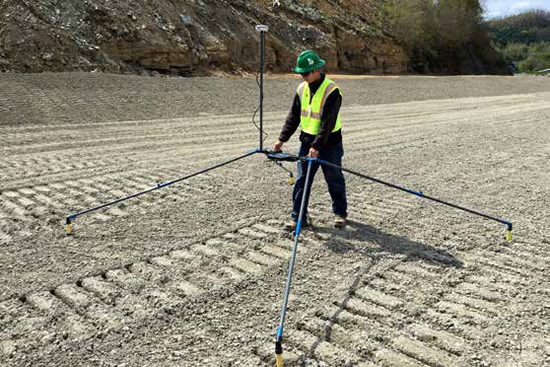TRI Environmental will host four geosynthetics CQA training courses and two certification opportunities 7 – 12 April 2019 in Austin, Texas. The events are part of the next CQA Week. Construction Quality Assurance experts in projects utilizing geosynthetics ensure the effectiveness of the materials and their role in providing long-term service lives and economical performance. Major infrastructure sectors, such as waste management and mining, benefit directly from the knowledge these professionals provide.

Registration discounts are available for multiple attendees from a company and for government employees.
DOWNLOAD BROCHURE (PDF)
REGISTER ONLINE
GEOSYNTHETICS CQA TRAINING & CERTIFICATION SCHEDULE
The course and certification schedule:
- April 7: Liner Integrity Survey/Assessment (LISA) Training
- An optional Level 2 ELIS Certification Exam is offered at the end of the day’s education
- April 8 – 9: Slope Stability of Containment Systems
- April 10: Construction QA/QC for Geosynthetic Installations
- April 11: Construction QA/QC for Geosynthetic Clay Liners and Compacted Clay Liner Installation
- April 12: GCI-ICP Certification Exams
Instructors for the CQA Week events include:
- Sam Allen – Vice President and Division Manager, TRI
- Jeffrey Blum – Senior Project Manager for Weaver Consultants Group
- Abigail Gilson, M.S., P.E. – Senior Engineer for TRI/Environmental
- Dr. Ranjiv Gupta, P.E. – Senior Engineer for Freeport-McMoRan
- Jeffrey Kuhn, P.E. – Director of TRI Geotechnical Laboratory
- Mark Sieracke, P.E. – Landfill Design and CQA Consultant
TRI COURSE DESCRIPTIONS
Liner Integrity Survey/Assessment Training – April 7
A Liner Integrity Survey (Electrical Leak Location) is a state-of-the-art, nondestructive method of locating leaks in installed geomembranes. LISA equipment, rooted in geophysical measurement techniques, tests exposed and soil or water-covered geomembranes. TRI’s training course disseminates the theoretical and practical knowledge required to employ and specify the quality of LISA methods and equipment. The course includes a classroom example of a test cell process which simulates the ELL testing process.
RELATED: Maximizing Electrical Leak Location Effectiveness with Covered Geomembranes
The Liner Integrity Surveys/Assessments (LISA) class provides the most up-to-date information on survey methods and standards (e.g., ASTM). It is ideal for design engineers, CQA firms, site owners, and regulators interested in specifying and employing this service. Consult the geosynthetics CQA training courses brochure for details on the Level 2 Certification for liner integrity surveys.

Slope Stability of Containment Systems – April 8 – 9
This two-day course provides insight from the independent testing and geoenvironmental consulting & owner’s perspectives on a wide range of containment structures (e.g., municipal and hazardous waste landfills, coal ash surface impoundments, heap leach pads). These facilities are constructed using multiple layers of geosynthetic materials such as geomembranes, geotextiles, geonets, geocomposites, and geosynthetic clay liners (GCL). The design of a containment structure not only requires an understanding of the properties of each individual geosynthetic material but also the ability to comprehend the interaction mechanism (friction) between various geosynthetic layer interfaces. This understanding of interface friction between various geosynthetic layers becomes even more challenging as the interface governing the stability of slopes within a containment structure may change depending on if the project is in a construction phase, a waste filling phase, or being closed with a final cover system.
Construction QA/QC for Geosynthetic Installations – April 10
&
Contruction QA/QC for Compcated Clay and Geosynthetic Clay Lining Systems – April 11
These courses are designed as a stand-alone course but may be taken as a package. They are designed specifically for those who need a detailed understanding of proper CQC and CQA procedures at waste containment facilities. The courses provide ideal preparation for the Geosynthetic Certification Institute’s Inspectors Certification Program (GCI-ICP) exam. Gain comprehensive understanding of:
- Preparing CQC/CQA plans
- Reviewing CQC/CQA plans
- Performing CQC/CQA observations and tests
- Reviewing field CQC/CQA procedures
Each course presents material that complements the other. Day 1 focuses on installation of geomembranes, geotextiles, geocomposites, geogrids, and geo-appurtenances. It includes demonstrations of geomembrane seaming and seam peel and shear testing. Day 2 focuses on the installation of compacted clay and geosynthetic clay liners (GCLs). Special emphasis will be given to establishing rationale and standard operating procedures for field inspections, documentation of test and visual observations, and implementation of CQA plans. A broad appreciation for the manufacture and installation of containment facility materials will be provided. Additionally, a tour of TRI’s Geosynthetic Testing and Research Laboratories will support class curriculum through test demonstrations, details on some TRI internal R&D projects, and discussion of other relevant topics.
GCI – ICP Certification Exams (Optional) – April 12
Geosynthetics CQA training students are allowed to sit for the Geosynthetic Certification Institute – Inspectors Certification Program (GCI-ICP) exams. All exam-interested students MUST REGISTER with the Geosynthetic Institute (GSI) and pay GSI’s certification fee before the test. TRI does NOT collect this fee. Contact GSI (+1 610 522 8440) for more information.
DOWNLOAD BROCHURE (PDF)
REGISTER ONLINE











